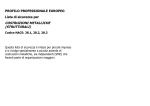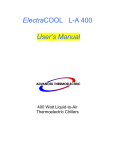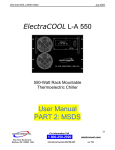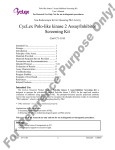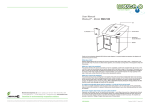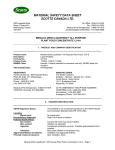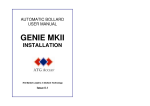Download Cambridge Sensors microdot Specifications
Transcript
FAST. ACCURATE. EASY TO USE. Xtra OPERATIONS & Q U A L I T Y A S S U R A N C E PROC E D U R E M A N U A L For Healthcare Professionals Xtra Contents TABLE OF CONTENTS Chapter Page 1. Microdot® Xtra Meter Overview & System Components 2-4 2. Initial Setup of the Microdot Xtra Meter 5-7 3. Control Solution Testing 8 - 10 4. Testing with Patients 11 - 12 5. Microdot Xtra Meter Specifications 13 6. In-Service Training Outcomes 14 7. Microdot Xtra Blood Glucose Meter Log Sheets 7A. Microdot Xtra BGMS In-Service Form 7B. Microdot Xtra BGMS Qualified Trainers Form 7C. Microdot Xtra BGMS Qualified Trainer/Operator Certification Form 7D. Microdot Xtra BGMS Quality Control Record 15 16 17 18 19 8. Material Safety Data Sheets 8A. Microdot Xtra Test Strips 8B. Microdot Control Solutions 20 21 - 24 9. Troubleshooting the Microdot Xtra Meter 25 10. Manufacturer Cleaning Instructions 26 Notes 27 - 28 Cambridge Sensors USA, LLC 1 Chapter 1 ® Xtra BLOOD GLUCOSE METER OVERVIEW This section provides general information on the Microdot Xtra Blood Glucose Monitoring System The Microdot Xtra Blood Glucose Monitoring System is a portable whole blood testing system which performs tests with quick and accurate results. It consists of three main parts: 1. Microdot Xtra Blood Glucose Meter 2. Microdot Xtra Test Strips 3. Microdot High and Low Control Solution These products have been designed, tested and proven to work together as a system to produce safe and accurate results. Use only Microdot Xtra Test Strips and Control Solutions with the Microdot Xtra Glucose Meter. Your system includes: Microdot Xtra Meter Anti-microbial Meter Cover Quality Assurance Manual Warranty Registration Card 3V Lithium Battery (installed) Additional components include: Microdot Xtra Test Strips Microdot Control Solutions 2 Cambridge Sensors USA, LLC Chapter 1 SYSTEM COMPONENTS ® Xtra Blood Glucose Meter LCD Screen: Shows blood glucose result and symbols that guide you through the test. Up/Down Toggle Buttons: Scrolls the memory, sets time and date. Eject Button: Releases test strip. Test Strip Port: Insertion site for test strip. Serial Number: Located in the upper left hand corner of the meter. Required when calling Customer Service for troubleshooting or meter replacement. SN 00023463 Customer Service: 888-425-1149 Battery Compartment: Holds one 3V Lithium battery (CR2032). t es Customer Service Number: Located on the back of the meter. Call this number if you have any questions or problems with the Microdot Xtra Glucose Meter. (877) 374-4062 Cambridge Sensors USA, LLC 3 Chapter 1 SYSTEM COMPONENTS ® Xtra Test Strip The Microdot Xtra Blood Glucose Test Strip offers the latest advances in biosensor, auto-code technology. Blood is applied to the top edge of the Microdot Xtra Test Strip and is automatically drawn into the white channel where the reaction takes place. Only 600 nanoliters (0.6 microliters) is needed. The Microdot Xtra Test Strip consists of the following parts: Top Edge: Apply a drop of blood here, where the white channel meets the top of the edge strip. White Channel: This is where you check if enough blood has been applied to the top edge. Contact Bars: Insert this end of the test strip into the meter. Push firmly until the strip can go no further. 4 Cambridge Sensors USA, LLC Chapter 2 INITIAL SETUP OF THE ® Xtra METER Before using the Microdot Xtra Meter for the first time, you should set the actual Time, Date and Year. The unit of measurement is preset and can not be changed. Setting the Time, Date and Year Enter the Set Mode. To Enter the set mode, turn the meter on by pressing the C button. After the segment test, the time and date will start to flash. Step 1 Set the Time and Date Format. Pressing the C button again will now toggle between US and International Time and Date formats. 1. For US: 12h Time format, mm-dd (begins with AM setting). To accept the desired setting, press the M button. Step 2 Set the Hour. The Hour will start to flash. It can now be changed by pressing the C button. The US setting will begin at 12:01 AM and will move to PM. To accept the correct setting, press the M button. 2. Step 3 Set the Minutes. The Minute will start to flash, it can now be changed by pressing the C button. To accept the correct setting, press the M button. 3. Repeat Steps 1 & 2 to set Month and Year. Cambridge Sensors USA, LLC 5 Chapter 2 INITIAL SETUP OF THE Setting the Beeper After setting the Time and Date, the Sound symbol will appear and can now be changed by pressing the C button. To accept the setting, press the M button. This option is used to switch on or off the beeper. When turned ON, a sound will be heard when blood or control solution is applied to the strip and when the test is finished. The sound will be heard when an error has occurred or if an alarm is triggered. When the M button is pressed to accept the beeper option, the meter will display END and switch off. 6 Cambridge Sensors USA, LLC ® Xtra METER Chapter 2 INITIAL SETUP OF THE ® Xtra METER Using Meter Memory Your Microdot Xtra Meter stores the 500 most recent blood glucose and control solution test results and insulin data with date and time in the memory. It also provides you with 14-day averages of your blood glucose test results. You can review the test results in memory with these easy steps. Step 1 Enter the Memory Mode. To Enter Memory Mode, turn on the meter by pressing the M button. 1. The meter will display the last result with Mem. symbol, time and date. Step 2 Recall Test Results. Previous results can be displayed by pressing the C button. As long as the C button is held, the meter will scroll through the memory displaying the result and the memory location. Once the button is released, the meter will display the selected result with its Time and Date. When the memory is full (500 results stored), the oldest result is dropped as the newest is added. 2. NOTE: When using the meter for the first time “Mem.---” will appear, showing that there are no test results stored in memory. Cambridge Sensors USA, LLC 7 Chapter 3 CONTROL SOLUTION TESTING This chapter describes the necessary steps to test with the Microdot® Control Solutions in order to validate the performance of the Microdot Xtra Meter and Microdot Xtra Strips. When Should You Conduct a Control Solution Test? Operating Guidelines: Any time you open a new vial of test strips. Use only Microdot Control Solutions (High and Low). Whenever you think the system is not working properly. Check the expiration date on the control solution vial. Do not use if expired or if the discard date has passed. If the blood glucose test results differ from the resident’s symptoms or non-symptoms. If you believe the results are not accurate. If you drop the meter. If the vial of test strips has been left open for an extended period of time. It is critical to follow the Operating Guidelines, on the right, to obtain accurate results while using the Microdot Xtra Glucose System. Control solution, meter and test strips should come to room temperature before testing (66-77˚F / 20-25˚C). Use solution for three months after first opening. Record the discard date (opening date plus three months) on the control solution vial. Discard after three months. Close tightly and store the control solution at temperatures between 50-86˚F (10-30˚C). Do not refrigerate. Do not freeze. 8 Cambridge Sensors USA, LLC Chapter 3 CONTROL SOLUTION TESTING Notes: Control Solution Test Procedure: The control solution test is similar to a blood test except that you use Microdot® Control Solution instead of a drop of blood. The control solution ranges printed on the test strip vial are for Microdot Control Solutions only. It is used to check the meter and test strip performance. It is NOT a recommended range for your blood glucose level. When performing a control solution test it does not matter which solution you use first, the Low or High. 1. Shake Low Control Solution bottle well before using. 2. Remove cap and discard the first drop of Control Solution and wipe off the dispenser tip to ensure a good sample and an accurate result. 3. Insert a test strip into the Microdot Xtra meter. Be sure the black contact bars go into the meter. Push the strip in firmly. Be sure it can go no further. 3. 4. Invert bottle and squeeze out one drop of control solution. Apply the drop to the strip by bringing the meter and the strip to the drop. Touch the drop with the top edge of the test strip and wait until the test pad fills with the solution. Results appear in 10 seconds. 4. Cambridge Sensors USA, LLC 9 Chapter 3 CONTROL SOLUTION TESTING 5. Compare the results with the ranges of expected results shown on the test strip vial. (Low = Blue Cap, High = Red Cap) If the test result is still out of range, call your Microdot® Customer Service Representative at: 6. You should obtain results within the expected range printed on the test strip vial. If this is not so, repeat the test. Toll Free (877) 374-4062 If the results are out of the range printed on the test strip vial, check the following: DO NOT test blood until you obtain control results within the expected ranges. Was the vial at room temperature? Did you shake the bottle of control solution before using? Has the control solution expiration or discard date expired? Is the meter malfunctioning? 7. Repeat steps 1-6 for the High Control Solution procedure. 10 Cambridge Sensors USA, LLC Chapter 4 TESTING WITH PATIENTS This section describes the procedure to test patient blood samples using the Microdot® Xtra Blood Glucose System. Operating Guidelines Before attempting to test with real blood, make sure you have performed control solution tests correctly to ensure the meter and test strips are performing properly and to verify technique. Use the test strips before their expiration date and within three months after opening. Do not use test strips that are wet, bent, scratched or damaged. Use each test strip immediately after removing it from the vial. Patient Test Procedure: What You Do Notes 1. Press the C button to turn the meter on and/or insert test strip by pushing the two contact bars in firmly. To verify all display symbols are working, all symbols should appear at the same time. If any of the symbols are missing or do not display completely, contact Cambridge Sensors USA at (877) 374-4062 2. Obtain a drop of blood. Using a safety lancet, lance the side of the finger to obtain a rounded blood sample. Avoid squeezing the puncture site excessively. Cambridge Sensors USA, LLC 11 Chapter 4 TESTING WITH PATIENTS What You Do 3. Apply sample. Notes The blood drop symbol will flash alternately to indicate the meter has detected that a test strip has been inserted and is ready for the blood sample to be added. Apply the drop of blood directly to the edge of the test strip, and allow the sample to wick automatically into the test zone. If you do not apply a blood sample within one minute, the meter will turn itself off. Either reinsert the test strip or press the M button to turn the meter back on. 4. Results in 10 seconds. After an adequate blood sample has been applied to the test strip, the Microdot® Xtra Meter will display three running dashes, which indicates the meter is performing the test. After 10 seconds, the test result will display. 5. Dispose of lancet. Dispose of used lancet in an approved sharps container. 6. Dispose of test strip. Simply press the eject button on the meter to dispose of used test strip. Note: If the blood test result is lower than 20 mg/dL, “Lo” will appear on the meter display. This indicates severe hypoglycemia (low blood glucose). You should immediately treat your hypoglycemia as recommended by your physician’s protocol. 12 Cambridge Sensors USA, LLC If the blood test result is higher than 525 mg/dL, “Hi” will appear on the meter display. This indicates severe hyperglycemia (high blood glucose). You should immediately treat your hyperglycemia as recommended by your physicians protocol. Chapter 5 ® Xtra METER SPECIFICATIONS Sample Size 0.6 Microliters (600 Nanoliters) Total Test Time 10 Seconds Sample Application Strip is placed in the meter and sample wicks into strip Hematocrit Range 30 - 50% Measurement Range 20 to 525 mg/dL Interference No interference from over 20 interfering substances Strip Removal Strip ejection by push button Coding Auto-code Accuracy of Strip/Meter System At least +/- 20% relative to YSI in clinical trials Correction Coefficient of Regression > 0.969 Precision of Strip The strip variation is not greater than 6.4% Shelf Life of Meter Approx. 5 years Operating Humidity range 10 - 90%; storage 90% max (non-condensing) Operating Temperature 50˚ - 104˚F (10˚ - 40˚C) Type of Glucose Result Plasma equivalent Strip Vial Packing Size 50 strips per vial Typical Control Solution Ranges when used with Strips/Meter Printed on vial label Strip Shelf Life after Opening 3 months Strip Vial Plastic with desiccant sleeve vial Altitude To 10,000 ft (Target) Module Size 65 mm x 85 mm x 16 mm Weight Approx. 60 grams / 2 ounces Battery Life 1,500 tests or about 1 year at three tests per day Glucose Units mg/dL or mmol/L Memory Total of 500 glucose results and insulin-input data Power Source One replaceable 3V lithium battery (CR2032 or equivalent) Automatic Shut-off One minute after last user action Warranty 1 Year Manufacturer Warranty Cambridge Sensors USA, LLC 13 Chapter 6 IN-SERVICE TRAINING OUTCOMES Once your Microdot® Xtra Meter in-service is complete, Health Care Professionals should be able to: 1. Locate and explain the following components of the Microdot Xtra Meter: Eject Button Test Strip Port Battery Compartment Serial Number Customer Service Number 2. Locate and explain the label information on the Microdot Xtra Test Strip Vial: Discard Date Lot Number Expiration Date Control Ranges Storage Temperature Range Low vs. High Discard Date Lot Number Expiration Date Storage Temperature Range 6. Properly insert the Microdot Xtra Test Strip 7. Perform control solution tests 8. Document and maintain Microdot Xtra Quality Control Records 9. Obtain a blood sample 3. Set Time and Date of meter 10. Perform a blood test 4. Identify three parts of the Microdot Xtra Test Strips 11. Identify meter result range Top Edge Test Pad Contact Bars 14 5. Identify the following parts of the Microdot Control Solution Bottles: Cambridge Sensors USA, LLC 12. Access meter memory 13. Change the battery 14. Identify and resolve error readings Chapter 7 ® Xtra BLOOD GLUCOSE MONITORING SYSTEM LOG SHEETS The forms in this chapter are Master Copies. Please make photocopies for distribution. If you need replacement documents, please contact Customer Service at (877) 374-4062 Cambridge Sensors USA, LLC 15 Chapter 7 ® Xtra BLOOD GLUCOSE MONITORING SYSTEM IN-SERVICE FORM The Health Care professionals listed below are trained and have demonstrated proficiency using the Microdot Xtra Blood Glucose Monitoring System. Cambridge Sensors Representative/Qualified Trainer Date Health Care Professional’s Name The chart is designed for use during the initial training on the Microdot Xtra Blood Glucose System by a Cambridge Sensors Representative, In-Service Video or Qualified Trainer. 16 Cambridge Sensors USA, LLC Chapter 7 ® Xtra Date BLOOD GLUCOSE MONITORING SYSTEM QUALIFIED TRAINERS FORM Health Care Professional’s Name Title Cambridge Sensors Representative Cambridge Sensors Representative Signature Date Cambridge Sensors USA, LLC 17 Chapter 7 BLOOD GLUCOSE MONITORING SYSTEM QUALIFIED TRAINER/OPERATOR CERTIFICATION FORM ® Xtra I. Microdot Xtra Meter - Locate the following: a. Battery b. Serial Number c. Toll Free Customer Service Number d. Eject Button II. Identify and explain the following: a. Blood Test Procedure b. Control Solution Procedure c. Troubleshooting III. Explain proper procedure for: a. Dating of Microdot Xtra Test Strips and Control Solution b. When to perform a Control Test c. Handling Control Solution results that are out of range IV. Perform and explain the following procedures: a. Control Solution testing b. Blood testing c. Recalling test results d. Changing the battery If all tasks were not properly completed, have the operator repeat the procedure correctly. When all tasks have been properly completed, sign bottom of this form and fill out the proper Qualified Trainer or In-service form. Cambridge Sensors USA Sales Rep. Date Qualified Trainer Operator 18 Cambridge Sensors USA, LLC Date Date Chapter 7 ® Xtra BLOOD GLUCOSE MONITORING SYSTEM QUALITY CONTROL RECORD Microdot Xtra Meter Serial Number Month/Year Date Station/ Initials Test Strip Lot # Low Control Range (mg./dl.) Low Control Result (mg./dl.) High Control Range (mg./dl.) High Control Result (mg./dl.) Notes: Cambridge Sensors USA, LLC 19 Chapter 8 MATERIAL SAFETY DATA SHEET ® Xtra Blood Glucose Test Strips Section I - Identification Trade Name: Microdot Xtra Blood Glucose Test Strips Common Name: Blood glucose test strips for use with Microdot Xtra Blood Glucose Test System Supplier: Cambridge Sensors USA 10051 Bode Rd. Palinfield, IL 60585 Emergency Phone Number: (877) 374-4062 Section II - Composition This product does not present a physical or health hazard under reasonable use or under emergency situations involving a release of only this product. This material is therefore not considered to be a “Hazardous Chemical” as defined by the Federal Occupational Safety and Health Administration in the Hazard Communication Standard (29 CFR 1910.1200) or the equivalent standards generated by state agencies. ACCORDINGLY NO MATERIAL SAFETY DATA SHEET IS REQUIRED FOR THIS PRODUCT. MSDSs that represent non-hazardous chemicals are not covered by the HCS. Paragraph 29 CFR 1910.1200 (g) (8) of the standard requires that “the employer shall maintain in the workplace copies of the required MSDSs for each hazardous chemical, and shall ensure that they are readily accessible during each work shift to employees when that are in their work area(s)”. OSHA does not require or encourage employers to maintain MSDSs for non-hazardous chemicals. Consequently, an employer is free to discard MSDSs for non-hazardous chemicals. 20 Cambridge Sensors USA, LLC Chapter 8 MATERIAL SAFETY DATA SHEET Microdot® Control Solutions Section I - Identification Trade Name: Microdot Control Solutions Common Name: Control Solutions for use with Microdot Xtra Blood Glucose Test System Supplier: Cambridge Sensors USA 10051 Bode Rd. Palinfield, IL 60585 Emergency Phone Number: (877) 374-4062 Section II - Composition / Information on Ingredients Chemical Family: Chemical Name: Salt solution N/A Section III - Hazards Identification Eye Contact: Skin Contact: Ingestion: Inhalation: Chronic Exposure May cause irritation if in contact with eye. Skin contact may cause irritation. Though not a likely route of occupational exposure, ingestion of the product may cause choking, vomiting or nausea. N/A N/A Section IV - First Aid Measures Eye Contact: Skin Contact: Ingestion: Inhalation: Chronic Exposure: Although no adverse health reactions are expected from the normal use of this product, it is recommended to flush eyes with water and seek medical advise whenever there is a potential injury to the eye. If contact with this product leads to reddening, inflammation or irritation, flush the exposed area with running water. If irritation persists, get medical attention. As a precaution, get medical attention if there has been ingestion of this product. If breathing becomes difficult, remove victim to fresh air and get medical attention. N/A Cambridge Sensors USA, LLC 21 Chapter 8 MATERIAL SAFETY DATA SHEET Microdot® Control Solutions Section V - Fire Fighting Measures Auto-flammability Flash Point (test method) Extinguishing Media Special Fire Fighting Procedures Fire and Explosion Hazards Hazardous Combustion Products Upper Explosion Limit (%) Lower Explosion Limit (%) Not determined Not determined Use fire extinguishing media appropriate for site collections. Structural fire fighting gear and self-contained breathing apparatus will provide adequate protection if this product is in a fire area. Not determined Thermal decomposition may emit carbon monoxide and carbon dioxide. Not determined Not determined Section VI - Accidental Release Measures Spill and Leak Procedures Use an absorbent material to contain/pick up the spilled solution. Place all contaminated disposals into a suitable container, seal, label and hold for disposal. Section VII - Handling and Storage Storage Temperature Handling/Storage Ventilation Requirements Sensitivity to Static Electricity Sensitivity to Mechanical Impact Store vials as directed in the package insert. Handle and store vials as directed by the package insert. No special requirements. Not known Not known Section VIII - Exposure Controls / Personal Protection Respiratory Protection Ventilation Protective Gloves Other Protective Equipment Other Engineering Controls Work Practices Hygienic Practices 22 Cambridge Sensors USA, LLC Not required under normal use of this product. Not required under normal use of this product. Wear appropriate gloves to prevent skin contact. Replace torn or punctured gloves promptly. Wear appropriate eye protection to prevent eye contact. Wear appropriate body protection to prevent skin contact. Eye wash stations and deluge showers. Good laboratory technique should be used when handling this product. Observe appropriate chemical hygiene. Do not place in mouth. Do not eat, drink or smoke while working with this product. Upon completion of work activities involving this product, wash hands thoroughly with soap and water. Chapter 8 MATERIAL SAFETY DATA SHEET Microdot® Control Solutions Section IX - Physical and Chemical Properties Pure Substance or preparation Appearance/Odor Odor Threshold Melting/Freezing Partition Evaporation Rate Vapor Pressure (mmHg) Vapor Density (air =1) Viscosity Volatiles Volatile Organic Compounds Auto-flammability Flash Point Oxidizing Properties Stability Materials to Avoid Hazardous Decomposition Products Preparation Physical Form Liquid Blue, odorless pH AS is neutral Not determined Not determined Not determined Not determined Not determined Not determined Not determined Not determined Not determined Not determined Not determined Not determined Stable Strong bases, strong acids and water reactive materials Thermal decomposition may emit carbon monoxide and carbon dioxide. Section X - Toxicological Information Route of Entry Effects of Chronic Exposure Effects of Acute Exposure Special Health Effects Target Organs Ingestion, skin and/or eye contact Not known Not known Not known Not known Section XI - Ecological Information Potential Effect on Environment Potential to Bioaccumulate Mobility Ecotoxicity Persistence and Degradeability Aqua Toxicity Not known Not known Not known Not known Not known Not known Section XII - Disposal Considerations Water Disposal Empty Container Warnings Please consult local, state and federal regulations for additional guidance on disposal. Not known Cambridge Sensors USA, LLC 23 Chapter 8 MATERIAL SAFETY DATA SHEET Microdot® Control Solutions Section XII - Transport Information (See also Section IX) ADR / RID CEFIC Tremcard Hazchem Code Kemmler Code IMDG Classification IATA Classification Marine Pollutant UN Number UN Class UN Packing Group Not known Not known Not known Not known Not known Not known Not known Not known Not known Not known Section XIV - Regulatory Information EEC Hazard Classification Risk Phrases Safety Phrases Not known Not known Not known Section XV - Other Information Directives 88/379/EEC and 91/155/EEC have been considered when compiling this MSDS; the information is provided for health and safety assessment by an industrial user. Reference should be made to any relevant local or national health, safety or environmental legislation. This information does not constitute indication of suitability for specific uses. The information, data, and recommendations contained herein are based upon information believed by Cambridge Sensors USA, after reasonable investigation and research, to be accurate. However, Cambridge Sensors USA does not warrant the accuracy of this information. All materials and mixtures may present unknown hazards and should be used with caution. When necessary or appropriate, independent opinions regarding the risk of handling or exposure should be obtained from trained professionals. Cambridge Sensors USA disclaims any warranty against patent infringement and the implied warranties of merchantability and fitness for a particular purpose. Customer’s sole and exclusive remedy shall be replacement of the product or return of the product and refund of the purchase price, at Cambridge Sensors USA option. In no case can Cambridge Sensors USA be liable for incidental or consequential damages, including lost profits. 24 Cambridge Sensors USA, LLC Chapter 9 TROUBLESHOOTING THE ® Xtra METER The blood glucose level is higher than 525 mg/dL. This message indicates very high blood sugar. You should recheck the blood glucose level. If “Hi” again, follow facility protocol. The blood glucose level is lower than 20 mg/dL. This message indicates very low blood sugar. You should recheck the blood glucose level. If “Lo” again, follow facility protocol. Error message that indicates that there is a problem with the meter, e.g., measurement error (time out, overflow, offset) or temperature out of range. Review the instructions and try again with a new test strip. If the problem persists, contact Customer Service. Error message that indicates that there may be a problem with the test strip, e.g, the test strip may be damaged, moved, or removed during testing, or inserted improperly. Check the test strip for damage and retest as necessary. Repeat the test. If the error message appears again, contact Customer Service. Error message could be caused by a used or damaged test strip. Repeat the test with a new strip. If the error message appears again, contact Customer Service. Error message indicates serial communications error. If error persists, contact Customer Service. The battery sign appears on the display with the unit of measurement. The power of the battery is getting low. You can complete about 50 more tests from the time this symbol first appears. Test results will be accurate but replace the battery as soon as possible. Battery type is CR2032 3 volt. Cambridge Sensors USA, LLC 25 Chapter 10 ® Xtra C L E A N I N G YO U R M E TE R Cleaning Your Meter First, remove the anti-microbial meter cover. Second, use a lint free cloth dampened with soapy water or isopropyl (70% - 80%) to clean the outside of the blood glucose meter. Microdot Meter Disinfecting Guideline: To disinfect the meter, dilute 1 mL of household bleach (5% - 6% sodium hypochlorite solution) in 9 mL of water to achieve a 1:10 dilution (final concentration of 0.5% - 0.6% sodium hypochlorite). The solution can then be used to dampen a paper towel (do not saturate the towel). Then use the damped towel to thoroughly wipe down the meter. Please note that there are commercially available 1:10 bleach wipes from a variety of manufactures. Germicidal wipes are readily available through major medical distributors. To use these products, remove a wipe from container and follow product label instructions to disinfect meter. Take extreme care not to get liquid in the test strip dock or key code parts of the meter. Cambridge Sensors USA, LLC Customer Service available from from 8am - 5pm CST Monday - Friday Toll free 1.877.374.4062 | www.microdotcs.com 26 Cambridge Sensors USA, LLC Notes 27 Cambridge Sensors USA, LLC Notes Cambridge Sensors USA, LLC 28 CAMBRIDGE SENSORS USA, LLC • 10051 Bode Rd. Plainfield, IL 60585 Customer Service: toll free: 877.374.4062 Monday–Friday 9am–5pm CST www.microdotcs.com

































